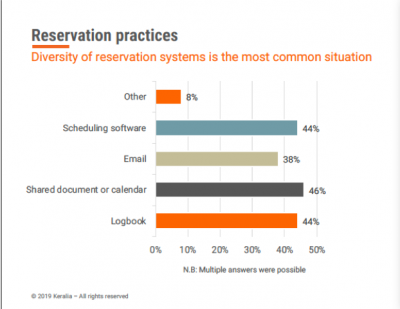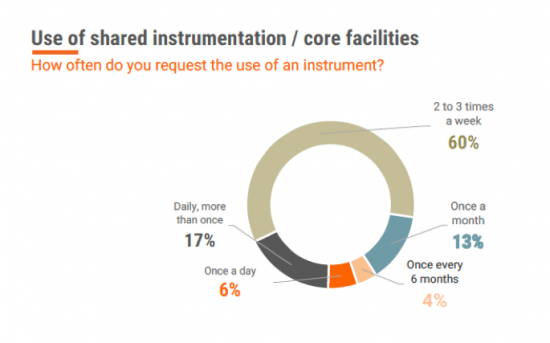In July 2019, we commissioned a study with Science & Medicine Group, a leading business intelligence firm focusing on life sciences.
Our intention was to better understand how researchers were using scientific instrumentation in their daily work and what the impact of shared technology platforms and core facilities was on their projects.
In this post, we’re sharing a few insights from this study which involved 100+ academia and industry research organizations across Europe and North America.
Diversity is the most common situation
We’ve discovered that researchers are most often faced with diversity : When it comes to accessing a shared facility, 82% of researchers have to juggle with various and heterogeneous scheduling systems (emails, shared calendars, logbooks, scheduling softwares, etc.). This is the most common situation by far, across geographies and industries or academia.
This situation is confusing for users who are faced with multiple systems depending on the kind of instrument they need. It makes it difficult for research organizations to have a consolidated view of technology usage and capacity, adding operating costs and workload that could be avoided.

Shared instrumentation has become central to research projects
Close to 70% of researchers in our panel declare they’re using shared instrumentation and/or core facilities all the time or frequently, with 23% making daily requests and 60% doing so 2 to 3 times a week.

We’ve discovered that a majority of requests are for basic instrument reservations, walk-in services i.e direct users who book the instrument they need and perform their experiments by themselves. Very few users are putting requests for a full service i.e they let someone else, typically a core facility specialist, choosing the instrument and run the experiment for them, and they’re only interested in getting the results.
This would indicate that, although core facilities tend to offer more sophisticated services, they are still earning their bread and butter from mere instrument rentals.
Scheduling systems are key components of overall performance
Not surprisingly in this context of high demand for shared instrumentation, scheduling systems are perceived as a critical component of the overall research cycle, from ideas to experiments to results.
73% of researchers and 88% of instrument or core facility managers deem a good scheduling system necessary or critical to their jobs. On average, our panel has declared that such a system could alleviate 25% of their total experiment workflow time.
As a case in point, it’s interesting to note that, when experiments are delayed, it’s most often due to a lack of coordination between operational activities, like for instance the chosen instrument is under maintenance or reagents are unavailable, all of which could be avoided by a consolidated core facility management system.
Finally, our survey provides some insights on average time spent by research teams on common tasks in relation with the use of shared instrumentation, like finding and booking the desired instrument, or designing an experiment, or tracking utilization and invoicing data for instrument managers.
We hope it can provide useful inputs for helping research organizations put up convincing business cases for implementing modern management systems and streamlining their operations in an area that has become pivotal to research’s efficiency.
Want to learn more, download our full survey!
You can download our full report for free here.

